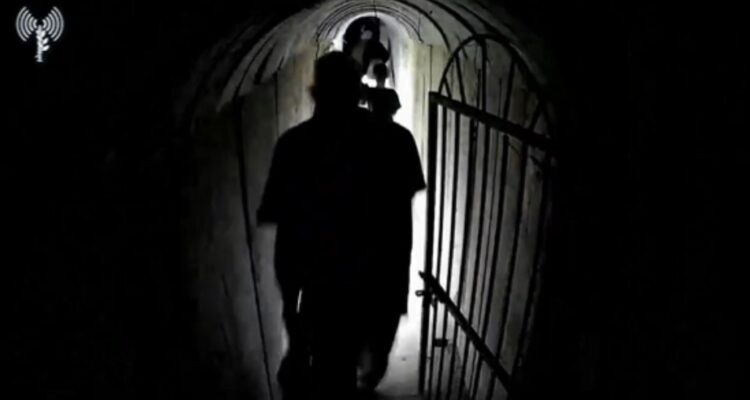Tunnels between the Strip and Egypt are used for smuggling luxury items, people out of Gaza, and weapons for Hamas facilitated by bribes to Egyptian officials.
By Yaakov Lappin, JNS
An estimated 50 cross-border tunnels link Gaza to Egypt’s Sinai, enabling Hamas to smuggle weapons, funds and personnel, and black-market traders to import a range of goods to the Strip.
Yoni Ben Menachem, a senior researcher at the Jerusalem Center for Public Affairs, said that since the Israel Defense Forces has not yet captured all of Rafah and the Philadelphi Corridor, aka the Philadelphi Route or the Saladin Axis (the narrow strip of land along the 8.7-mile border between the Gaza Strip and Egypt), the estimate for the number of tunnels could easily rise.
The current IDF operations have focused on specific points such as the Rafah crossing and parts of the Philadelphi Corridor, as well as eastern Rafah, but they are due to expand shortly.
According to Ben Menachem, the tunnels serve purposes beyond smuggling weapons. These include the transportation of “prohibited goods such as luxury goods, cigarettes and pornographic materials, which are then sold on the black market in Gaza at high prices,” he noted, highlighting the financial aspect of the smuggling operations.
He also said there was likely high-level corruption at the Rafah crossing, where bribes are paid to Egyptian security officials to facilitate smuggling.
“According to Palestinian reports, bribery of senior officials at the Rafah crossing and Egyptian military officers on the Philadelphi Route enabled the transport of goods and weapons,” he said, underscoring the extensive network supporting smuggling activities, which he said has been occurring both over and underground.
As such, Ben Menachem said, the tunnels are part of a larger industry that includes the transfer of residents of Gaza into Egypt and beyond.
Ben Menachem referred to reports that claim Mahmoud el-Sisi, the son of Egyptian President Abdel Fattah el-Sisi, is heavily involved in these operations.
“According to Palestinian claims, Mahmoud el-Sisi, the powerful figure in Egyptian intelligence, is behind a front company named Hala, which organizes the passage of Gaza residents into Egypt,” he said. Gazan families pay thousands of dollars to leave Gaza, he added.
“I believe we are at this stage of still fighting in a limited area of Rafah, and have yet to conduct the large operation there. Israel is preparing to stay in Rafah, and wishes to destroy these tunnels. Israel cannot at this stage risk a direct diplomatic clash with Egypt over this, so the Americans will, I believe, deal with this on Israel’s behalf,” Ben Menachem assessed, referring to smoothing over security ties.
“The Egyptian army will have an financial problem, because they are being disconnected from the smuggling, an important income source,” he added.
Resolute in its fight
Col. (res.) Dr. Shaul Shay, a senior research fellow at the International Policy Institute for Counter-Terrorism at Reichman University in Herzliya, served as deputy head of the National Security Council of Israel between 2007 and 2009.
He told JNS that the Gaza-Sinai tunnels have been a longstanding issue, particularly active during the rule of former Egyptian President Hosni Mubarak and the brief presidency of Muslim Brotherhood figure Mohamed Morsi. “It is likely that many tunnels were operational during Mubarak’s era and certainly during Morsi’s short rule,” Shay explained.
Since the elder el-Sisi came to power as deputy prime minister in 2013 and then as president in 2014, Egypt has made significant efforts to combat terrorism and reduce the number of tunnels. Shay said, “El-Sisi’s government has been resolute in its fight against Islamist terrorist groups, including the Islamic State in Sinai and the Muslim Brotherhood, and part of these efforts included tackling the tunnel networks.”
Despite these efforts, “achieving 100% success is improbable,” Shay added.
He highlighted the strategic importance of maintaining good relations between Israel and Egypt, particularly in the context of the ongoing conflict against Hamas and humanitarian efforts.
“There is a clear strategic interest for both Israel and Egypt to maintain good relations, as evidenced by the cooperation on humanitarian activities through the Rafah crossing and Egyptian mediation regarding hostages,” Shay said.
The tunnels, he added, represent a concern for both countries, necessitating cooperative efforts.
“The IDF must decide on its next steps carefully to avoid jeopardizing relations with Egypt,” Shay cautioned, emphasizing the necessity for joint efforts to curtail the smuggling and promote regional stability.





